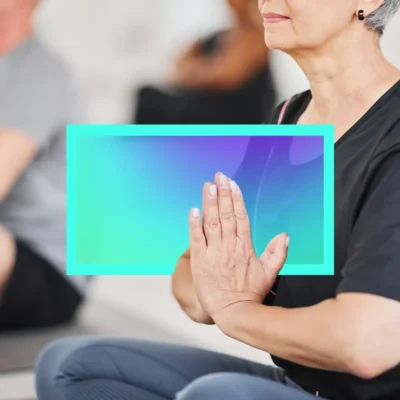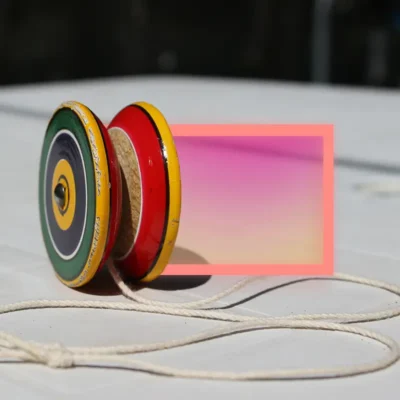Changing the game
Growing up in the Kennedy family, Tim Shriver sees close relatives compete at the highest level of U.S. politics and learns a very specific definition of what it means to be a winner. As a result, a fierce competitiveness finds its way into every aspect of his life. But as the years go on, Tim begins to question whether this winner-takes-all mentality is the healthiest way to live. Maybe there’s a way that competition can bring out the best in all of us, regardless of who gets the gold medal.


Table of Contents:
Transcript:
Changing the game
TIM SHRIVER: Tonight, my older brother Bobby is absent. He’s home from college for a week, and word is he lost a tennis match to my younger brother Mark. It’s not uncommon for one of us to skip dinner after a particularly embarrassing loss. Sometimes, it’s better not to show up than to face hearing your performance get ridiculed.
I look over. I see Mark grinning ear to ear. He’s the big winner tonight. I know that feeling. Winning is exhilarating.. But I know what else he’s feeling, too. It’s what I feel when I win. Victory is exalting, but it’s terrifying at the same time.
ROHAN GUNATILLAKE: Special Olympics chairman Tim Shriver grew up with a very specific idea of what it means to be a winner. As a member of the Kennedy family, he saw close relatives compete at the highest level of politics and grew accustomed to a winner-takes-all mentality. But as the years went on, Tim began to question whether competition necessarily had to be that way or if there was perhaps a more fulfilling way to play.
In this series, we combine immersive first-person stories, breathtaking music, and mindfulness prompts so that we may see our lives reflected back to us in other people’s stories. And that can lead to improvements in our own inner lives.
From WaitWhat, this is Meditative Story. I’m Rohan, and I’ll be your guide.
The body relaxed. The body breathing. Your senses open. Your mind open. Meeting the world.
SHRIVER: The voices of my parents echo down the hall. I can hear their exuberance in the room next door. I peek my head into the living room. My parents are sitting on a long, low couch. They’re beneath a wall of photographs of family members, and childhood scenes, and dignitaries. I’m 8 years old. No one notices as I tread lightly over the carpeted floor. Their focus is on my sister Maria. She stands at the center of the room. And I can recognize the familiar sound of accolades and praise. Maria is standing in the middle glowing. She holds up four ribbons and a silver trophy.
“What a show, Maria,” Dad says. “Just fantastic.”
“A triumph,” adds my mother.
Maria’s four years older than I am, but she’s already a nationally ranked equestrian. Her bedroom is filled with ribbons and medals, silver and gold adorning the entirety of her walls. Seeing the attention she gets, I decide I want to compete in these events too. After all, I love to ride — jumping and cantering and trotting. I love the feel of the horse.
So, the next weekend is my first show. It goes okay. I get third. But in our family, okay isn’t good enough. Coming in third means I’m really not that irrelevant.
My parents eventually notice me standing in the living room. They give me a half-embarrassed sort of sideways glance. “Oh. Timmy. Nice try.” That’s it. That’s all they have to say. The subtext is clear: “You’re not so good at this, so let’s pretend that it didn’t happen.” It stings a little. I feel kind of small. Like I suddenly don’t measure up.
I grow up in a maniacally competitive family. Everything is a competition. Who can get up first? Who can get to the car first in the morning? Who’s the best at tennis? Who’s the best at swimming? At football? Everyone wants to be the best. Everyone wants to win. That’s the only normal I know.
For as long as I can remember, my value as a human being has increased with competitive success and dropped with competitive failure. Being not so good at horseback riding doesn’t just mean I won’t get the same accolades as my sister. It means my rank in the unspoken system that pervades everything in our household goes down. I’m a little less than. I’m, kind of, well, “It’s a little embarrassing so let’s move on.” Some people might think that sounds like an exaggeration, but I know there are a lot of competitive families like mine where, where you finish determines how you’re valued. It’s simply true.
I quietly leave the room, and I let my sister enjoy her victory. I compete in one more horse show before I stop riding entirely. That’s the end of that.
Later that summer, I stand out in the shallow waters of Cape Cod. The warm sun is on my shoulders. And the waves are lapping rhythmically against my legs. And I line up with kids my age. Smaller ones are closer to the shore. Taller ones a little further out where they can still touch the bottom. It’s finally here: the end-of-summer race. 50 meters. Freestyle.
On the beach, a lifeguard blows a whistle. I push off the bottom and dive headfirst into the water. My heart pounds. I kick furiously. Stretch my arms out as far as they’ll go. Anything to give me an edge. My head stays down, looking forward. I’m focused. I sneak a peek to see if anyone’s ahead of me. I’ve been sizing up my competition. I may not be an amazing swimmer. But I know I can out-work everyone else.
I finally reach the red buoys that mark the finish line. I pop out of the water; I look around. “Did I win? Am I the fastest?” The onlookers on the beach are cheering. I feel like I’m just vibrating. The end of the race is kind of like a blur. My face hurts. I’m smiling so much. I can’t wait to get home. I’m gonna be the hero.
Whether it’s equestrian games or swimming races, medals are earned at the judges table. But in our house, the final judges’ table is the dinner table. It’s where all of our triumphs and failures, our wins and losses are exposed, are discussed, are examined. It’s where all the accounts are settled.
Years later, I walk into our dining room. The floorboards creak under my feet. It’s 6:30, dinner time. My mom’s already seated at the head of the long wooden table. There’s a fireplace to her left. And to her right: two big antique windows made up of dozens of smaller panes. The windows are almost always open. Behind her, is a 400-year-old statue of the Blessed Mother. The setting sun reflects off her passive, mournful face. Plates of mashed potatoes, and peas, and lamb chops sit on the table. My siblings and I take our seats. We say grace. Then, the debates begin.
Dad works late at the office, so mom presides over us and instigates lively discussions:
“Did you win your football game today? Why not?”
“Mark, Maria doesn’t agree with you. What do you think about that?”
“Well Timmy, if you were President, what would you say to that Senator to change his mind?”
Sports, politics, anything performative, it’s all up for discussion, it’s all up for critique. We defend our positions. Talk over each other. We aren’t afraid to hurl insults. To interrupt. To disagree. It can sometimes even seem vicious, but for us it’s normal. It’s even fun, at least some of the time.
Tonight, my older brother Bobby is absent. He’s home from college for a week, and the word is he lost a tennis match to my younger brother Mark. It’s not uncommon for one of us to skip dinner after a particularly embarrassing loss. God forbid you lose to a younger sibling. Sometimes, it’s better not to show up than to have to face hearing your performance get ridiculed. I look over, and I see Mark grinning ear to ear. He’s invincible. He’s the big winner tonight.
I know that feeling. Winning is exhilarating. Like a drug. But I know what else he’s feeling, too. It’s what I feel when I win. Fear. Worry. What if I’m the loser of the next game? What if I never win again? What if I am the one who becomes irrelevant? Victory is exalting, but it’s terrifying at the same time.
We dig into the dessert spread. Ice cream. Cookies. Angel food cake. Mom looks over her plate at her children. We’re all trying to get in the last word, to settle whatever inane argument we’re having. She smiles and says what she often says: “All my ducks are swans.”
My mom manages to keep even the most heated arguments somehow light. To check our worst tendencies. She’s an amazing storyteller. She has an incredible sense of humor. For us, winning and losing feels like life or death — our way to impress her, to meet her where she is as this constant larger than life winner. But at the end of the day, there’s an understanding that, no matter what, we’re all loved.
It’s a difficult balance to strike. I fight the urge to entangle my self-worth with my performance in every race, in every contest, at every dinner table debate. It’s hard enough to navigate within my own family, let alone when I head out into the world.
GUNATILLAKE: Does a time come to mind when you have had to compete with those close to you, and it felt linked to your self-worth? Let’s breathe with any memory or image or tension that might come up.
SHRIVER: I’m in a classroom in a big concrete building, almost no windows, but lots and lots of students. They come in shuffling, chairs scratching along the floor, throwing bookbags. The door is shut, and my students are settling in.
“Come on. Come on everyone. Settle down. You’re better than this, now come on,” I say for the third time, letting my voice rise a little more than I intended, but the 15 students who make up my class see my serious expression and take their seats. I see shamefaced looks from a few of my favorite students. I kind of regret snapping.
I’m just out of college. It’s my first year working in the public high schools in New Haven, Connecticut. I’m still finding my footing.
Some of the students are just unwilling to open up, to engage, to participate. I figure my role is to help them compete. Compete in school, so they can compete and go to college, so they can compete and get good jobs, so they can compete and have successful careers, so they can compete and have a good income and a stable family.
I want to transform these kids’ lives. To help them to win. And I feel like, at this moment, I’m losing at this challenge.
When I share my difficulties with my mentor, Dr. Donald Cohen, he frowns. He says, “It sounds like your students are struggling with a lot of challenges in their inner life — their emotions, their experience, their self-image for how they navigate the world.” My expression goes blank. What the hell is he talking about?
The next week, I’m standing nervously off to the side of a lecture hall watching one of my students, Charles, take a seat in front of a full team of psychiatry fellows. How did I agree to this? This is just a terrible idea. Asking a high schooler about their personal life while a bunch of grad students stare at him and jot down notes. My mentor sits in a chair opposite my student, and he waves a hand nonchalantly in the direction of the crowd. “I want you to imagine no one else is in the room. It’s just you and me. We’re going to create a little bubble here, just the two of us, and we’re going to carry on a conversation.”
I think to myself, “Are you kidding? This is the stupidest thing I’ve ever heard. This is not going to work.” But soon, my student, Charles, he’s sharing details from his life I’ve never heard before. He’s talking about his mom, their financial troubles, how hard it’s been to move around so much, and how he struggles with feeling discouraged, how he gets angry.
I start to see a complexity in him that I’ve never accessed. I, I just didn’t see before. I was focused on striving, on discipline, on work. But I’m not helping him in the area where he needs help, because I don’t know what to do in that area of my own life. I would never feel comfortable being as open and vulnerable as he is being right now. Sharing his inner life.
All those nights around my childhood dinner table drilled into me the idea that competition is the job of my brain, of my body, of my career, of my education, and of my relationships, of my faith, of my purpose. For the first 21 years of my life, I’d watch my father, my uncles engage in the highest level of competition there is: Presidential politics. And I’d watch my mother compete just as much.
But maybe, competition isn’t everything. It’s still important that I do my best. But do I always have to do better than everyone else? Watching my student share himself in this interview, I start to recognize how much of my own humanity I’m neglecting with my obsession on winning. What if the point of competition isn’t just to beat other people, but to bring out the best in you, to find out what matters most to you? To find your strengths. To forgive your weaknesses.
If competition means: “Who’s the best?” Then everybody’s your opponent, and almost no one wins. But if competition is, “What’s your best?” Then everybody’s there to help you. That kind of competition requires great vulnerability, and great wisdom, and great determination. And that’s what I saw in Charles’ face. I want to see it in myself, too.
The faint smell of chlorine fills my nose. Sunlight glints off the surface of the water. An orange ball is whizzing past my head. Among all the games my family plays together, water polo has the tendency to be the most vicious. Right now, my kids and I are in the middle of playing against my brother and his kids. We’re in the water, moving fast. House rules say that if somebody has the ball, you can push them underwater, you can hold them underwater until they let it go. And if you’re being held under. No one wants to let it go, so you kick, and you pull, and you do whatever they need to do to get away to avoid drowning. Nobody ever gets hurt. But it’s intense.
About 10 minutes into playing, I narrowly escape one of these underwater holds, ball still in hand, and I’m kicking hard with my legs. I twist, and I turn. And I look desperately around for an open teammate, but see no one. Someone grabs my shoulder but I chuck the ball towards one of my teammates, and she turns around and slams the ball into the end of the pool. We start to cheer and cheer, and then I hear another, less happy sound. Someone is yelling at the top of their lungs. They’re furious about something.
It’s my brother. He’s red-faced; he’s screaming, pointing an accusatory finger at our team. He thinks you cheated, you cheated. I can see the veins are kind of bulging out of the side of his neck as he rants. This isn’t unusual for these family games. There have been plenty of times where that was me. Caught up in the need to win, lashing out at anyone I think is standing in my way.
But my orientation has shifted a little. And I see this behavior, and it gives me pause. I know how isolating this winner-take-all, kill-or-be-killed attitude can be. It just doesn’t resonate with me anymore. Yes, I want my team to win. But this is a game. Isn’t it supposed to be fun? Isn’t the whole point that we’re here as a family, that we’re competing, but we’re having fun together? That we’re pushing each other to be our best?
I don’t know how to have this conversation with my brother. I don’t begrudge him for the screaming, for the determination. I know how he grew up, because it’s how I grew up. I get out of the pool, and I say, “I think we’re done playing.” And that’s the end of that.
GUNATILLAKE: This experience jolts Tim, and points him to the realization that maybe this way of being with others may not be as healthy as he thinks. Have you ever had a wake up call to a pattern that is not working or even damaging? Can you name the pattern? If it feels safe to bring to mind, then invite it here. And again let’s breathe with it, acknowledge it, and breathing out, let it go.
SHRIVER: I hear the distant sound of waves breaking on the beach a few hundred yards from my home in Cape Cod one summer evening. The smell of the ocean hangs in the air. A beautiful row of evergreens sits behind me. Round tables are organized in a semicircle on the grassy lawn. 60 people are there in attendance at a fundraiser I’m hosting with my wife, Linda.
It’s almost 9 o’clock. It’s a beautiful night. A big moon hangs in the night sky. I stand up from my seat, and I clink my glass. Conversation pauses. All eyes focus on me for what I think are going to be brief remarks.
“I want to thank you all for being here. I hope you’re enjoying this wonderful opportunity to come together.” But then almost spontaneously I say: “But there’s no free dinner. You’ve got to earn your keep.” And everyone kind of chuckles a little, unsure what I mean.
“You’re all extraordinary entrepreneurs in this room. Your businesses empower and recognize the gifts of people with intellectual, developmental disabilities. So you know something about leadership that the rest of the world doesn’t.” Everyone flashes a proud smile. As the Chair of the Board of Directors of the Special Olympics movement, I spend so many days surrounded by extraordinary people with this kind of energy, commitment, and passion. They invariably inspire me to be my best. So tonight, I’m feeling the urge to deliver my best.
“What you know about leadership,” I continue, “is important beyond this room. So let’s try to identify what it is. Let’s play a game.” I can’t resist turning the evening into a competition. It’s what I do. It’s been my instinct since childhood. But now, I’m doing it for a little bit of a different purpose.
I lay out the challenge. Each table is a team, and each team has to come up with one trait, one idea that best describes good leadership. You pick someone from your table, and that person will announce your team’s answer to the panel of judges, and the panel of judges is gonna select a winner. “Our judges consist exclusively of me, and you know I’m gonna be very impartial.” And everyone laughs.
And everyone perks up. The idea of a competition immediately creates stakes. People are working together, they’re talking, they’re sharing notes. I’m smiling, I’m watching everybody, they’re debating. And “Yeah, I know you want to win, but you better come up with something good.” I’m walking around, and the real point is starting to become clear I think to them, to identify, to share leadership traits, to build this community of people who are in the room. To engage, to lift each other up, to make a bigger win for everyone.
I announce it’s time for the results to come in, and I get to the last table,. A young man named John stands up to give his team’s report. John has a company that sells socks that he operates with his dad. It’s called John’s Crazy Socks. John also happens to have Down syndrome. He decides that “Focus” is the most important leadership trait. I press him to expand. I say, “Okay, John, how do you stay focused?”
He looks around the room, he says, “I love my dad, and my dad helps me stay focused. Our mission is to spread happiness, and we do it by selling socks. Our mission is our focus. That’s why focus is so important. Right, dad?”
Everyone looks over to see John’s dad. A tear runs down his cheek. Time kind of stops. John speaks from a place of vulnerability, a place of strength. A place of love. This competition creates a beauty, a wonder, a goodness that’s so far from the screams and the shouts of the contests from my past. I feel like something has come full circle.
I look back at John, a little in awe, and I say, “John, you win.”
Everyone at all the other tables stands and cheers. The judgment, the clear assignment of the winner, it’s all in service to the bigger purpose.
It’s kind of why I don’t shrink from the joy and the fun I have creating games. I love encouraging competition, threatening people with the absolutely devastating consequences of losing, as long as they know, or at least I hope they know, underneath it’s all a ruse.
Competition is a tool to find what’s best in you. It’s not a life or death. It’s a release. It’s a release of creativity, of spontaneity, of authenticity, of your best. That’s when we all triumph.
Rohan’s closing meditation
GUNATILLAKE: Thank you Tim.
The theme of competition that runs through Tim’s story made me remember my first ever meditation class. I can picture it very clearly.
There I was, sitting eyes closed with the teacher up front guiding us through the simple breathing practice. And instead of actually following any of it, I was ablaze with thoughts. Mainly about how useless at meditation I was, how useless I was always going to be, and how everyone else in the room was no doubt was in unicorn and rainbows-land, and here I was with this junk drawer for a mind.
Looking back on it, and much of my early life as a meditator, I was in competition with everyone around me, judging myself as nowhere as good. Sometimes that was just a fantasy such as in my first class (speaking to people afterwards, I soon found out we were all in the same boat). But sometimes it was very real as I got into groups and communities with people who were highly experienced and more advanced than me.
Judging and comparing ourselves with others can be so corrosive, in meditation and in life in general.
It can be a pattern to dwell on what others have — or what we think others have — and ignore the things we have. Not today.
Let’s settle the body, let it be how it is, dropping any thoughts of life outside our own experience for now and enjoying what is here.
If there is warmth, notice it and yes enjoy it.
If there is calm, notice it and enjoy it.
If there is a smile, smile.
If there is relaxation, drop into it.
Here we are, a community of people all around the world, doing the same — no competition with each other. Not today. If the sense of competition with others is here, holding it lightly. Just soft with it.
Once I’d learned to soften the sense that I was competing with others in meditation and mindfulness, I noticed that I was still very much competing with myself. Trying to make each session better than the one before, sitting for longer each time. It became a whole thing. Again, a bit corrosive for me, my practice became tight, and I lost my sense of fun.
And a technique that helped me move through this internal kind of competition with myself was one called counting. So let’s do a bit of that together.
Resting our attention on the breath, we make the silent note of one on the in-breath and one on the out-breath.
Then for the next breath, we note two on the in-breath and two on the out-breath and so on.
One, one. Two, two. Three, three.
All the way up to five. And when you get to five, or you get distracted, just start again.
Let’s give it a go for a little bit.
Ok. So the reason I love this technique is that it shows me my patterns. The patterns in which I am competitive with myself. The wanting to get a higher count each time before I get distracted. The frustration when I don’t. My tendency to cheat even. I use counting to see my inner competitive patterns.
This is one of the twisty things I learnt as I matured in mindfulness stuff. That when we do a technique, there is value in doing it in its obvious form. But the magic happens when we do a technique and watch how the mind reacts to how it gets on. That’s where the real learning is.
I love how Tim talks about competition as a tool to find out what’s best within us.
As we start to close, I’m reflecting on that thing Tim said about how he likes setting up competitive situations, but only as ruses.
That’s a bit like how I see meditation techniques. They are tools that point us to wisdom, but we have to hold them lightly.
So let’s finish up by holding things lightly.
Holding our body lightly.
Holding our breath lightly.
Holding our mind lightly.
Holding its patterns lightly.
It’s all a ruse, so that our natural qualities of wisdom and our natural qualities of the heart may resonate and be released.
Thank you Tim. And thank you.
We’d love to hear your personal reflections from Tim’s episode. How did you relate to his story? You can find us on all your social media platforms through our handle @meditativestory. Or you can email us at: [email protected].





